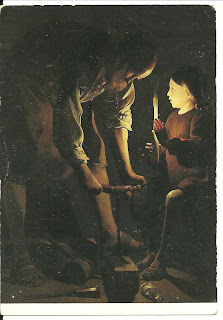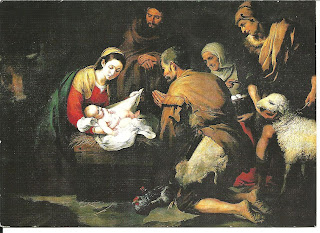Dostoevsky poses this question in his writing. "What do we owe each other? He takes it further by asking "What would this look like if we see it through the eyes of faith?
He means Faith in Christ. There is no specific tight connection with Orthodoxy (church) faith although The Orthodox Church belongs in the framework of his writing.
I commenced a list to respond to the first question with
1. RESPECT - I have wondered why I thought of this first. Maybe it was a safe 'word' but it is part of the story. Respect is demanded without consideration of appearance, assumed status or .....
2. LOVE - It might be assumed that agapeo - deep self giving love is what is meant here and only this love but a little more reflection would remind us that
'storge' - affection ,
phileo - friendship and
eros - being in love ALL belong here. No, not being in love towards everyone but where eros occurs it fits correctly here.
While each Greek word opens consideration for friend / family / the attractive etc: there remains the focus of love of / for the unlovely ..... unloveable ?? Can I even mention such a group?
3. SPACE - recognising, respecting AND allowing each person their space is essential to allow each of us to be person. What if he / she has no understanding of another's space?
4. JUSTICE - this is assumed .... talkfests discuss it but where do they lead?
If Justice occurred then all would be seriously disrupted. Fair pay for work done would inevitably lead to higher costs in first world countries. Western type lifestyles would be challenged in the West and among the Merbenzy tribes in third world countries. How do we address issues in the Jewish Torah which speak of various matters are worthy of death ... of being put to death NB. 'worthy of' ie not necessarily being put to death!! Just a thought. Why is Justice so closely connected to retribution? What if Justice involves something else all together?
(This arises from a few discussions with a brother in law who has been a judge for many years)
5. TRUST - every connection however, is totally depends on this. There is no way anyone can affirm that he / she is independent of others. Wealth in and of itself does not make us independent. Buying ones independence is totally dependent on TRUST. Whether it is on the operating table, buying a car/helicopter, eating food, all depend on TRUST. Each day is an act of Trust. We attach ourselves to a prevailing ideology which tends to govern how we live.
Breaking Trust is an evil almost beyond repair.
In his book "Surprised by Hope" Bishop Tom Wright reminds the church that "our mission" demands a message of Justice .... Beauty .... Homecoming ( By the latter he means The Gospel - calling everyone HOME by and through the Death and Resurrection of Jesus the Messiah)
So to what extent do we owe the Other
6 BEAUTY When my son James was with the Grenadier Guards in Afghanistan recently, the battalion lost 17 men and 70 returned seriously wounded and as James noted so many Afghani civilians were left devastated from the war. How do we enable all the families of the dead, the injured to again see and experience BEAUTY?
We, of course would be aware of many here at home who no longer "see" beauty for too many reasons
and
7. HOMECOMING How many of us live in houses rather than homes? AND, that before we even consider the HOMELESS. The prisoner, the traveller, the soldier, even the hospital patient come home to ? what? location? ... house? ... home?
The fundamental under pinning homecoming of the Gospel demands to be made known and lived in an exemplary manner. (Bringing Heaven and Earth together. a notion that many Christians need to consider far more carefully than the escapist notions that some have)
The hard consideration is reflecting on this list in terms of the second question.
I recognise that The Gospels and the Torah write of Love of neighbour as yourself with the serious focus on the story of the Good Samaritan .. answering the question : Am I my brother's keeper? ... affirming the declaration that we are all made in the image of God.
There is also the matter of care for ourselves. ! ? Reading some material on Grief and Depression remind me that there is serious room for allowing Space, Respect, Trust, Beauty, Love, Justice and Home Coming to be applied to ourselves. No NOT self absorption, that fails to address Grief and Depression.



